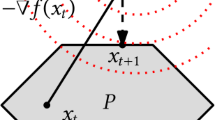Abstract
This paper introduces POEMS, parallelizable open-source efficient multibody software, as a modular research package being developed to serve as a backbone software for collaborative research in multibody dynamics. POEMS aims to serve as a repository of efficient implementations of relevant algorithms and be applied to varied applications of interest in research, academia and industry. It allows the user to model systems with varied topologies, and choose between different algorithms for generating and solving the equations of motion as well as for time integration. POEMS utilizes a growing number of solvers, integrators, and system types, which lays a good foundation towards its future development as an optimized, customizable, and parallelizable computational tool for multibody dynamics research and application.















Similar content being viewed by others
References
Masarati P, Moradini M, Quaranta G, Mantegazza P (2003) Open-source multibody analysis software. In: Conference proceedings, IDMEC/IST, Lisbon, July, 1–4
Kane TR, Levinson DA (1985) Dynamics: theory and application. Mcgraw-Hill, New York
Anderson KS (1993) An order-n formulation for the motion simulation of general multi-rigid-body tree systems. Comput Struct 46(3):547–559
Featherstone R (1999) A divide-and-conquer articulated body algorithm for parallel O(log(n)) calculation of rigid body dynamics. Part 1: basic algorithm. Int J Robot Res 18(9):867–875
Greengard L, Rokhlin V (1987) A fast algorithm for particle simulations. J Comput Phys 73:325–348
Brooks BR, Bruccoleri RE, Olafson BD, States DJ, Swaminathan S, Karplus M (1983) Charmm: a program for macromolecular energy, minimization, and dynamics calculations. J Comput Chem 4:187–217
Chun HN, Padilla C, Chin D, Masakatsuwatanabe, Valeri K, Alper H, Soosaar K, Blair K, Becker O, Caves L, Nagle R, Haney D, Farmer B (2000) MBO(N)D: a multibody method for long-time molecular dynamics simulations. J Comput Chem 21(3):159–184
Mukherjee R, Anderson KS (2005) An orthogonal complement based divide-and-conquer algorithm for constrained multibody systems. Nonlin Dynam (in press)
Mukherjee R, Anderson KS (2005) A logarithmic complexity divide-and-conquer algorithm for multi-flexible articulated body systems. Comput Nonlin Dynam (in press)
Bhalerao KD, Mukherjee RM, Anderson KS (2005) A divide and conquer direct differentiation approach for multibody system sensitivity analysis. In: Eleventh conference on nonlinear vibrations, stability, and dynamics of structures,
Acknowledgments
The funding for this work was provided by NSF NIRT 0303902, NSF State-Time 0219734, NSF CAREER 9733684 and the funding provided by Sandia national laboratories (document number 220699) for this project. The authors would like to thank the funding agencies.
Author information
Authors and Affiliations
Corresponding author
Rights and permissions
About this article
Cite this article
Anderson, K., Mukherjee, R., Critchley, J. et al. POEMS: parallelizable open-source efficient multibody software. Engineering with Computers 23, 11–23 (2007). https://doi.org/10.1007/s00366-006-0026-x
Received:
Accepted:
Published:
Issue Date:
DOI: https://doi.org/10.1007/s00366-006-0026-x



